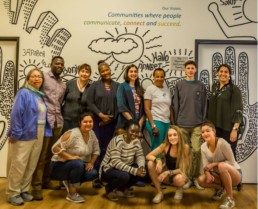A Socially Just Employment, Energy and Climate Transition for Boulder Colorado
Year Complete: 2019
Grant Amount: $50,000
Local Government: City of Boulder, CO
Local Foundation: Philanthropiece Foundation
Project Purpose
To guide Boulder’s Climate Action Plan and implementation to be equitable, inclusive, socially just and sustainable and to cultivate model green economic development projects.
Key Lessons Learned
Lessons about strategies, tools, and tactics that other sustainability directors could use
to advance their work.
Partnership with a university enabled the team to draw upon resources that would otherwise not be available in this process. Specifically, the university provided in-kind staff capacity support from faculty and administrative support. The project has also benefited from the engagement of multiple undergraduate and graduate students, particularly related to research. The university also contributed office and meeting space. Research related to just transition planning and measurement has been facilitated by the university partnership, and this in turn, has contributed to actions that are grounded in existing knowledge and useful concepts. This is replicable model for other communities that have universities or colleges.
To advance a just transition, directly impacted and underrepresented community members need to play a core role in guiding the development of climate and energy policies and programs. In order to do this effectively, the existing knowledge of community members needs to be validated; support needs to be provided to develop leadership and knowledge necessary for inclusive and productive engagement in policy-making processes; and, importantly, decision-making processes need to be open-ended, with the potential for community members to define the values and objectives of policies. For underrepresented community members to participate effectively, financial support needs to be provided (in the form of stipends).
It is essential to move forward intentionally and with due process to develop model projects in workforce development and green businesses. Specifically, allowing for input from multiple stakeholders before developing and implementing concrete plans and programs is key. This ensures the projects created are responsive to actual needs, and that they have the capacity and leadership necessary for effectiveness.
Lessons for developing a collaborative relationship between a local government sustainability director and local place-based foundation(s)
Rather than attempting to coordinate and implement the project as a bilateral partnership, the team have engaged the Just Transition Collaborative as an organization that is equipped with the skills and connections to work directly and intentionally with community members. This added needed capacity to the project and strengthened expertise and strategic approach. The foundation also provided staff capacity support which provided a greater connection to the work and the ability to strengthen relationships between project partners.

